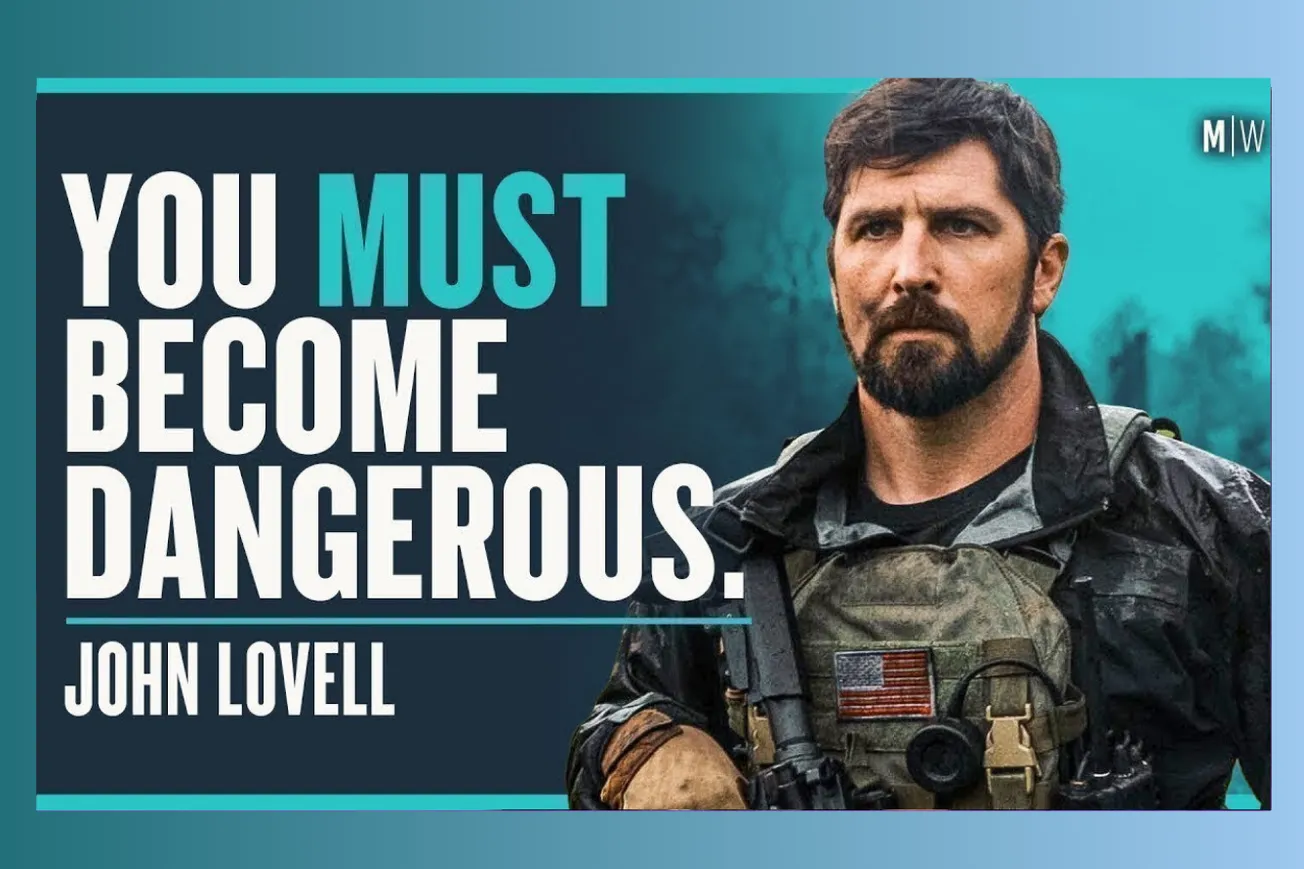Table of Contents
Former Army Ranger John Lovell reveals how combining warrior strength with poetic vulnerability creates unshakeable masculine courage and authentic leadership.
Key Takeaways
- True strength requires mastering both warrior attributes (protection, courage) and poet qualities (vulnerability, love)
- Fear must be faced daily - past heroic acts don't guarantee future bravery
- Passive men fail in both warrior and poet dimensions, lacking purpose and authentic connection
- Writing a death letter clarifies life priorities and eliminates trivial concerns instantly
- Perfect love conquers fear - fighting for others transcends personal survival instincts
- Humility enables continuous growth while arrogance caps potential at mediocre levels
- Physical strength matters least; emotional, mental, and spiritual strength determine real power
- Vulnerability with trusted people builds deeper relationships than perpetual emotional armor
- Living with death awareness prevents wasting time on meaningless pursuits
Timeline Overview
- 00:00-15:00 — Warrior poet ethos introduction, living free and dying well philosophy, tyranny of urgent vs. important tasks, military background context
- 15:00-30:00 — Combat experiences, near ambush survival stories, fear management across different scenarios, freezing moments and lessons learned
- 30:00-45:00 — Fear manifestation in civilian life, business challenges vs. combat stress, special forces contractor anecdotes about varied fear responses
- 45:00-60:00 — Modern masculinity crisis, passive men lacking warrior and poet qualities, marriage struggles and emotional growth requirements
- 60:00-75:00 — Vulnerability vs. humility distinctions, strength definitions beyond physical prowess, Chris Bumstead emotional vulnerability example
- 75:00-90:00 — Dangerous men being humble paradox, wrestling defeat story, arrogance limitations in skill development and character growth
- 90:00-105:00 — Pursuing goodness over greatness, legacy building through relationships, fear of failure acceptance and tactical advantages
- 105:00-120:00 — Inner coward recognition, facing death exercises, death letter writing process, philosophical and theological question resolution
The Tyranny of the Urgent vs. Living with Purpose
Most people spend entire lifetimes reacting to immediate pressures while neglecting what truly matters. Lovell's concept of the "tyranny of the urgent" perfectly captures modern life's trap: "if you were given a death diagnosis, much of the stuff that we droll on with every single day would immediately sift to the edges of our attention as not important."
This insight cuts to the heart of human psychology. We convince ourselves with the lie that "after this week it'll calm down" in an endless cycle until death arrives unexpectedly. Lovell witnessed this pattern repeatedly: "you'll die the exact same way that you live whether that's poorly or well."
- The cultural delusion of postponing real living until retirement at 65 ignores life's fundamental uncertainty and mortality
- Combat experience revealed how death awareness instantly eliminates trivial concerns and clarifies authentic priorities
- Most "urgent" daily stresses would become irrelevant if we truly grasped our limited time on earth
- Living with purpose requires rejecting the reactive lifestyle that consumes most people's entire existence
- Starting with "the end in mind" prevents decades of misdirected energy toward meaningless pursuits
- Real impact happens now, not in some hypothetical future when we finally have enough money or time
Combat Lessons on Fear and Courage Under Fire
Lovell's most counterintuitive insight about courage challenges everything we believe about bravery: "no one ever Masters fear. Every single day you got to get up and fear will manifest itself in a million different ways." Even after surviving multiple near ambushes designed to kill everyone, he experienced moments of complete paralysis during less dangerous situations.
His description of freezing reveals the unpredictable nature of fear: "I remember two different freezing points where the terror was so stark I just locked up I couldn't move... in my head it was like my legs were concrete for minutes at a time." These moments taught him that past heroic acts provide zero guarantee of future bravery.
The ideal combat mindset he describes as "cold hard math" - making calculated decisions while chaos erupts around you: "though the world is on fire and falling apart around you and you're pretty sure you're about to eat it you're just gonna do the right thing and make the next right decision."
- Near ambushes occur within 35 meters (hand grenade range) where survival depends entirely on aggressive breakthrough tactics
- Combat produces three emotional states: terror-induced freezing, rage-fueled aggression, or ideal calm mathematical thinking
- A special forces contractor with 19+ combat tours told Lovell: "I can run toward gunfire but contracts freak me out"
- Fear transfers unpredictably between contexts - combat veterans often struggle more with civilian bureaucracy than life-threatening situations
- The freezing moments prove that courage isn't inherited or permanent but must be consciously cultivated daily
- Sometimes rage provides the fuel ("how dare you try to kill me"), other times calm calculation works best
Modern Masculinity Crisis: Neither Warriors Nor Poets
Lovell's diagnosis of modern masculinity cuts deep: "passive men are neither Warriors nor poets they're weak in both areas." These men fail to pursue women romantically, avoid meaningful challenges, and spend hours daily on video games while neglecting both strength development and emotional growth.
His insight about what women actually desire challenges both traditional and progressive masculinity narratives: "every single one of our Brides or girlfriends wishes perhaps they don't have the words that we're using here but they want you to be bold and dare they want a leader they want your strength but they also want your heart."
The solution isn't choosing between strength and sensitivity but mastering both: "it's not lover or fighter it's both it's lion and lamb Warrior and poet." Lovell admits his own struggles: "I'm naturally more lion I'm naturally more Warrior I had to learn through a painstaking process how to save my marriage which was really rough for the first couple years."
- Passive men avoid pursuing relationships actively, preferring comfortable routines over the vulnerability required for deep connection
- They lack protective instincts (warrior) and emotional intelligence (poet), making them unattractive to women seeking complete men
- Modern culture discourages both traditional masculine leadership and genuine emotional vulnerability, leaving men directionless
- Women want men capable of both "strong arms" for protection and emotional availability for intimate connection
- Many men fear being labeled tyrannical if they demonstrate leadership, so they retreat into ineffective passivity
- The cultural messaging creates false binary choices between toxic masculinity and emasculated weakness
Lovell's 16-year marriage transformation proves that men naturally stronger in one area can develop the other through conscious effort and commitment.
Strength Beyond Physical: The Four Pillars of Male Power
Lovell's redefinition of strength exposes how most men focus on the least important dimension: "when I think a strong man I don't think you got lats growing out of your ears... Physical strength is the least important unless you're fighting Vikings or something like that."
His brutal assessment of emotional weakness hits hard: "if somebody cuts you off in traffic and you lose your mind over that you're a pathetically weak dude you're angered too easily really that sets you off you can't even control your own stupid temper your weak man you're weak."
This hierarchy reveals where real power comes from: spiritual strength provides meaning and purpose, mental strength solves life's complex puzzles, emotional strength maintains stability under pressure, and physical strength matters only in rare circumstances.
The relationship insight cuts deepest: "you don't talk to chicks the same way you talk to dudes and if you try to you're going to destroy your life you'll feel tough but you're an idiot you're going to destroy all your relationships because you're an idiot."
- Spiritual strength forms the foundation - without meaning and moral clarity, other strengths become directionless
- Mental strength requires continuous learning since "life is a series of all kinds of different puzzles and you gotta be smart"
- Emotional regulation separates mature men from reactive boys who explode over minor inconveniences
- Physical strength ranks lowest because most modern challenges require intelligence, character, and emotional wisdom
- Men who communicate identically with everyone lack the sophistication needed for successful relationships
- Character development and moral foundation matter infinitely more than bench press numbers or physical appearance
The strongest special operations soldiers Lovell knew often appeared physically unimpressive but possessed unshakeable character and emotional regulation under extreme pressure.
Vulnerability, Humility, and the Paradox of Dangerous Men
Lovell's crucial distinction between vulnerability and humility provides tactical wisdom for relationship navigation: "I let me model humility but I don't know you I'm not necessarily going to be vulnerable with you I may have enemies out there I'm not going to show you my soft underside."
He contrasts this with intimate relationships: "love risks love allows somebody to be able to wound you you can't love and also Safeguard and protect yourself at the same time it opens up wide arms and bears its soul to someone."
His wrestling humiliation story perfectly illustrates how arrogance caps potential. As the school's top wrestler with multiple records, he faced what seemed like an out-of-shape middle-aged soccer coach: "this middle-aged kind of portly dude... the dude just took me apart... while he was chatting with me too so it's like he didn't know I was in the fight of my life."
This defeat revealed a pattern among elite operators: "the most dangerous men on the planet... at the very tippy top of those guys there are always these more humble unassuming guys." The reason? "The Arrogant guy can only get so tough and it can only get so far... you have to be teachable and to be teachable well arrogance will only let you get so far."
- Vulnerability belongs exclusively in trusted relationships where love creates appropriate risk-taking
- Humility can be safely demonstrated publicly because it signals teachability rather than weakness
- Arrogant soldiers often wash out of elite units despite impressive physical capabilities
- Those with "longer suffering grit and character under the hood" succeed where physically gifted but proud soldiers fail
- The wrestling defeat taught that presumed superiority creates dangerous blind spots and prevents learning
- True strength grows through continuous learning, which requires humbling yourself before better teachers
Lovell's theological framework explains this pattern: "Pride goes before a fall" and "humility is the very center of morality and pride is the very center of immorality."
Facing Death to Clarify Life: The Death Letter Exercise
Writing a death letter before combat deployment forced Lovell to examine unfinished business and clarify true priorities. This exercise reveals what deserves attention when time becomes finite and eliminates trivial concerns instantly.
- Death letters contain final words to family and friends, sealed for delivery if the soldier doesn't return alive
- The writing process forces examination of relationships, unresolved conflicts, and unexpressed gratitude before potential death
- Unfinished business creates mental ambushes during crisis moments, potentially compromising decision-making when heroism is required
- Settling theological and philosophical questions prevents distraction during life-threatening situations requiring complete focus
- Forgiveness work eliminates bitter roots that poison multiple life areas even when consciously ignored
- Understanding what's worth dying for clarifies what's worth living for and eliminates confusion about life priorities
The exercise doesn't require military deployment - anyone can benefit from confronting mortality to gain perspective on daily choices and relationship investments.
Perfect love casts out fear because protecting others transcends personal survival instincts. Soldiers fight bravely when motivated by love for their teammates rather than personal glory or survival.
Conclusion
John Lovell's warrior poet philosophy reveals that authentic masculine strength requires mastering both protective courage and emotional vulnerability. Modern men often fail by choosing passivity over growth in either direction, missing opportunities to become complete leaders in their relationships and communities. True power emerges not from conquering fear once, but from facing it daily while building character through humility, purpose, and love for others.
The death letter exercise and commitment to continuous growth in physical, emotional, mental, and spiritual strength create men capable of both defending what matters and connecting deeply with those they protect.
Practical Implications
- Write your own death letter to clarify priorities and resolve unfinished business with family and friends
- Deliberately face your specific fears through direct exposure rather than avoidance or accommodation
- Develop strength in all four areas: physical training, emotional regulation, continuous learning, and spiritual/moral development
- Practice vulnerability selectively with trusted people while maintaining humility publicly in all relationships
- Pursue goodness and legacy over fame and financial accumulation as primary life objectives
- Regularly examine whether you're living reactively to urgent demands or proactively toward meaningful goals
- Train both warrior qualities (protection, courage, leadership) and poet qualities (emotional connection, truth-seeking, creativity)
- Accept that courage must be earned daily regardless of past heroic actions or accomplishments
- Forgive others even when undeserved to prevent bitterness from poisoning your own character and relationships
- Identify what's truly worth dying for to understand what's worth living for with complete commitment





